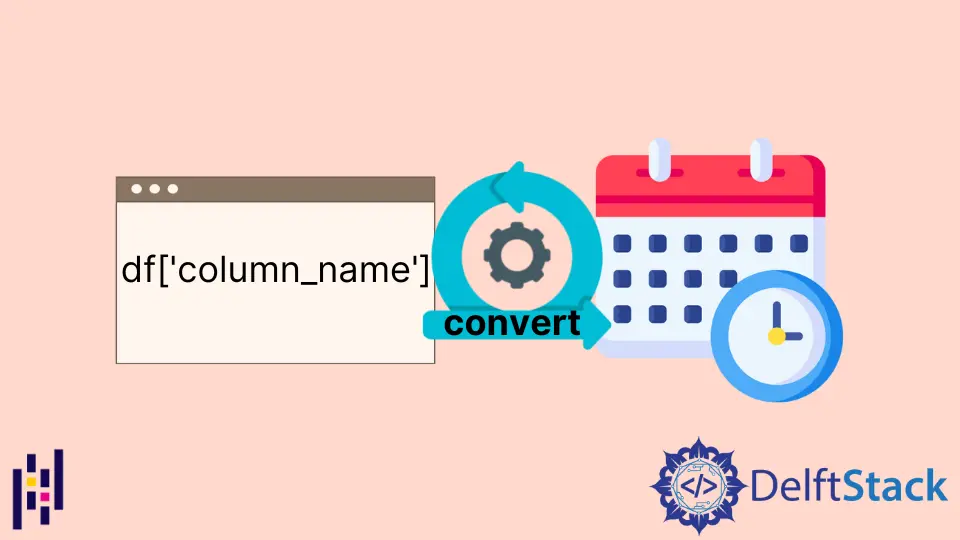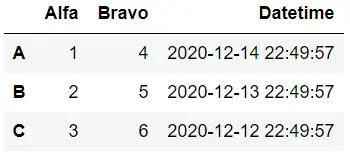How to Convert Pandas Column to Datetime
-
Pandas
to_datetime(pd.to_datetime()) Function to Convert DataFrame Column to Pandas Datetime -
Use the
apply()Method to Convert Pandas DataFrame Column to Datetime -
Use the
apply()Method to Convert Pandas Multiple Columns to Datetime -
Use the
Series.astype()Method to Convert Pandas DataFrame Column to Datetime

We will introduce methods to convert a Pandas column to datetime. We use the same DataFrame below in the following examples.
from datetime import datetime, timedelta
from pandas import DataFrame
df = DataFrame.from_dict(
{
"Alfa": [1, 2, 3],
"Bravo": [4, 5, 6],
"Datetime": [
datetime.strftime(datetime.now() - timedelta(days=_), "%m/%d/%Y, %H:%M:%S")
for _ in range(3)
],
},
orient="index",
columns=["A", "B", "C"],
).T
print(df)
Output:
Alfa Bravo Datetime
A 1 4 12/07/2019, 14:08:55
B 2 5 12/06/2019, 14:08:55
C 3 6 12/05/2019, 14:08:55
Pandas to_datetime (pd.to_datetime()) Function to Convert DataFrame Column to Pandas Datetime
Pandas pd.to_datetime() function converts the given argument to datetime.
pandas.to_datetime(param, format="")
The format parameter in the Pandas to_datetime function specifies the pattern of the datetime string. It is the same with the format in stftime or strptime in Python datetime module.
Example of pd.to_datetime() Converting Pandas Column to datetime
import pandas as pd
from datetime import datetime, timedelta
from pandas import DataFrame
df = DataFrame.from_dict(
{
"Alfa": [1, 2, 3],
"Bravo": [4, 5, 6],
"Datetime": [
datetime.strftime(datetime.now() - timedelta(days=_), "%m/%d/%Y, %H:%M:%S")
for _ in range(3)
],
},
orient="index",
columns=["A", "B", "C"],
).T
df["Datetime"] = pd.to_datetime(df["Datetime"], format="%m/%d/%Y, %H:%M:%S")
print(df)
Output:

The pd.to_datetime() function doesn’t modify the DataFrame in place; therefore, we need to assign the returned Pandas Series to the specific DataFrame column.
Pandas to_datetime() (pd.to_datetime()) Function Is Smart to Convert to Datetime
The pandas.to_datetime() function could do the conversion to datetime in a smart way without being given the datetime format string. It will find the string pattern automatically and smartly.
>>> df['Datetime'] = pd.to_datetime(df['Datetime'])
>>> df
Alfa Bravo Datetime
A 1 4 2019-12-07 14:08:55
B 2 5 2019-12-06 14:08:55
C 3 6 2019-12-05 14:08:55
Although pd.to_datetime could do its job without being given the format smartly, the conversion speed is much lower than when the format is given.
We could set the option infer_datetime_format of to_datetime to be True to switch the conversion to a faster mode if the format of the datetime string could be inferred without giving the format string.
It could increase the parsing speed by 5~6 times.
Options When the Input Argument Is Not a Valid DateTime String
to_datetime() has the errors parameter to specify the behavior if the given input is not a valid datetime string to be parsed.
errors Option |
Behaviour |
|---|---|
raise |
An exception will be raised. Default option |
coerce |
NaT is set |
ignore |
invalid parsing returns the input |
raise
It raises an exception when the errors option is raise or is omitted because raise is the default option.
import pandas as pd
from datetime import datetime, timedelta
from pandas import DataFrame
df = DataFrame.from_dict(
{
"Alfa": [1, 2, 3],
"Bravo": [4, 5, 6],
"Datetime": [
datetime.strftime(datetime.now() - timedelta(days=_), "%m/%d/%Y, %H:%M:%S")
for _ in range(3)
],
},
orient="index",
columns=["A", "B", "C"],
).T
df["Datetime"][0] = "32/09/2020, 09:27:02"
df["Datetime"] = pd.to_datetime(
df["Datetime"], format="%m/%d/%Y, %H:%M:%S", errors="raise"
)
print(df)
>>>
....
....
File "pandas\_libs\tslibs\strptime.pyx", line 157, in pandas._libs.tslibs.strptime.array_strptime
ValueError: time data '32/09/2020, 09:27:02' does not match format '%m/%d/%Y, %H:%M:%S' (match)
>>>
coerce
import pandas as pd
from datetime import datetime, timedelta
from pandas import DataFrame
df = DataFrame.from_dict(
{
"Alfa": [1, 2, 3],
"Bravo": [4, 5, 6],
"Datetime": [
datetime.strftime(datetime.now() - timedelta(days=_), "%m/%d/%Y, %H:%M:%S")
for _ in range(3)
],
},
orient="index",
columns=["A", "B", "C"],
).T
df["Datetime"][0] = "32/09/2020, 09:27:02"
df["Datetime"] = pd.to_datetime(
df["Datetime"], format="%m/%d/%Y, %H:%M:%S", errors="coerce"
)
print(df)
Output:
Alfa Bravo Datetime
A 1 4 NaT
B 2 5 2020-05-08 09:37:55
C 3 6 2020-05-07 09:37:55
The invalid item is set to be NaT, and others are converted correctly.
ignore
If errors is set to be ignore when any of the column items are not valid, then the input column will be returned, even if other items are valid datetime strings.
import pandas as pd
from datetime import datetime, timedelta
from pandas import DataFrame
df = DataFrame.from_dict(
{
"Alfa": [1, 2, 3],
"Bravo": [4, 5, 6],
"Datetime": [
datetime.strftime(datetime.now() - timedelta(days=_), "%m/%d/%Y, %H:%M:%S")
for _ in range(3)
],
},
orient="index",
columns=["A", "B", "C"],
).T
df["Datetime"][0] = "32/09/2020, 09:27:02"
df["Datetime"] = pd.to_datetime(
df["Datetime"], format="%m/%d/%Y, %H:%M:%S", errors="ignore"
)
print(df)
Output:
Alfa Bravo Datetime
A 1 4 32/09/2020, 09:27:02
B 2 5 05/08/2020, 09:41:28
C 3 6 05/07/2020, 09:41:28
As shown above, the whole Datetime column is not converted or is ignored.
Use the apply() Method to Convert Pandas DataFrame Column to Datetime
apply(func, *args, **kwds)
apply method of Pandas Series applies the function func to each column or row.
We could use the lambda function in the place of func for simplicity.
>>> df['Datetime'] = df['Datetime'].apply(lambda _: datetime.strptime(_,"%m/%d/%Y, %H:%M:%S"))
>>> df
Alfa Bravo Datetime
A 1 4 2019-12-07 14:44:35
B 2 5 2019-12-06 14:44:35
C 3 6 2019-12-05 14:44:35
Use the apply() Method to Convert Pandas Multiple Columns to Datetime
If we need to convert Pandas DataFrame multiple columns to datetiime, we can still use the apply() method as shown above.
Suppose we have two columns, DatetimeA and DatetimeB, that are datetime strings.

The function passed to the apply() method is the pd.to_datetime function introduced in the first section.
Example code:
import pandas as pd
from datetime import datetime, timedelta
from pandas import DataFrame
df = DataFrame.from_dict(
{
"Alfa": [1, 2, 3],
"Bravo": [4, 5, 6],
"DatetimeA": [
datetime.strftime(datetime.now() - timedelta(days=_), "%m/%d/%Y, %H:%M:%S")
for _ in range(3)
],
"DatetimeB": [
datetime.strftime(
datetime.now() - timedelta(days=_ + 3), "%m/%d/%Y, %H:%M:%S"
)
for _ in range(3)
],
},
orient="index",
columns=["A", "B", "C"],
).T
print(df)
Output:

Use the Series.astype() Method to Convert Pandas DataFrame Column to Datetime
The astype() method of the Pandas Series converts the column to another data type. The data type of the datetime in Pandas is datetime64[ns]; therefore, datetime64[ns] shall be given as the parameter in the astype() method to convert the DataFrame column to datetime.
import pandas as pd
from datetime import datetime, timedelta
from pandas import DataFrame
df = DataFrame.from_dict(
{
"Alfa": [1, 2, 3],
"Bravo": [4, 5, 6],
"Datetime": [
datetime.strftime(datetime.now() - timedelta(days=_), "%m/%d/%Y, %H:%M:%S")
for _ in range(3)
],
},
orient="index",
columns=["A", "B", "C"],
).T
df["Datetime"] = df["Datetime"].astype("datetime64[ns]")
print(df)
Output:
Alfa Bravo Datetime
A 1 4 2020-12-14 22:34:54
B 2 5 2020-12-13 22:34:54
C 3 6 2020-12-12 22:34:54
Founder of DelftStack.com. Jinku has worked in the robotics and automotive industries for over 8 years. He sharpened his coding skills when he needed to do the automatic testing, data collection from remote servers and report creation from the endurance test. He is from an electrical/electronics engineering background but has expanded his interest to embedded electronics, embedded programming and front-/back-end programming.
LinkedIn FacebookRelated Article - Pandas DataFrame
- How to Get Pandas DataFrame Column Headers as a List
- How to Delete Pandas DataFrame Column
- How to Convert a Float to an Integer in Pandas DataFrame
- How to Sort Pandas DataFrame by One Column's Values
- How to Get the Aggregate of Pandas Group-By and Sum
Related Article - Pandas DataFrame Column
- How to Get Pandas DataFrame Column Headers as a List
- How to Delete Pandas DataFrame Column
- How to Get the Sum of Pandas Column
- How to Change the Order of Pandas DataFrame Columns
- How to Convert DataFrame Column to String in Pandas
